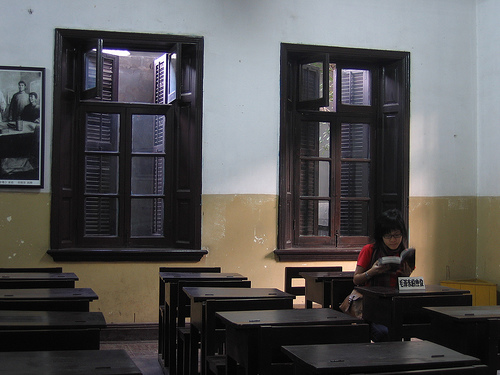Last week, I began to sketch out the current poetry unit I am teaching in the seventh grade. I am still not ready to share the “paper work.” You now the objectives, essential questions, assessments, and criteria. I have it all planned out, but I don’t feel the need to document that part of the story on my blog just yet. I want the story of this unit to be like the work with my students; we are still trying to pry ourselves away from the literal. English is not their first language you see, so they are having a difficult time allowing language to set them free. They still cling to what they know and write exactly what they see. They cannot see that poetry is the key that will free them from the shackles of language acquisition.
Yesterday, we spent some time playing with metaphor, simile, and personification. We returned to the shared Google .Doc we created last week and began to explore the phrases we found there. I did not teach a lesson on figurative language or literary devices; I didn’t want to confuse them. I simply showed them how to do it and let them practice. I am starting to think this may be a better approach. There is no need to know what a simile is to write one, so why not practice first, get the hang of it and then say, “Oh by the way, what you just did there- comparing two things using the word like is called a simile, or see how you made the sun drink and laugh? That is called personification.”
We played on the document for about forty minutes. “Find a nice spot on the document and carve out your space. Take an idea and give it some life. Describe the flower or give the bee a personality.” They are getting really mature about using a shared space like Google .Doc. At first there was a lot of giggling and erasing words and what not, but now we are all business. “We are not doing anything with this document for a while. We are not writing poetry. We are just describing the world. Don’t be afraid to take chances and be weird. Weird is good. Write what you think and let it flow out of you. Don’t think so much” I don’t want them to get caught up in the concept of poetry. I just want them to do it.
The next day, I handed out some photographs from a box I have called Poetry Starters. They are provocative sensory rich images, but nothing one couldn’t create from Flickr, and told them to practice what they did yesterday, which was to write freely using sensory language as well as personification, simile and metaphor. Of course, they do not know that is what they are doing. Most struggled. Many of them simply wrote exactly what they saw. We work on. I have done this before and know that it is a long haul, but we will slowly take one step at a time.

image by theilr
Next, we started a book called Love That Dog,
Love That Dog is the story of Jack, his dog, his teacher, and words. The story develops through Jack’s responses to his teacher, Miss Stretchberry, over the course of a school year. At first, his responses are short and cranky: “I don’t want to” and “I tried. Can’t do it. Brain’s empty.” But as his teacher feeds him inspiration, Jack finds that he has a lot to say and he finds ways to say it.
We just started it. There is a a section early on when he is discovering rhythm and rhyme. As we read it lifelessly, I had an idea. A spontaneous revelation hit me, so I ran with it. “I want this half of the class to read lines 1, 3, 5, 7 and this side to read 2, 4, 6, 8. Ahh come on you can read with more life and energy than that. Can’t you feel that? What is that called? Yes! Right! Rhythm, now feel it and read like you mean it.” We went back and forth, each time reading with more intensity. “Now follow me.” I started tapping out a beat on the table. They followed. “Come on louder! Don’t be shy. Beat that table. Feel that rhythm.” We were groovin’ now. “Good now read the poem and tap. Feel it don’t read it!”
It was awesome. They were smiling, laughing, reading, tapping. They were poetry. I quickly hit record on Garageband and recorded a take. Next class I want them to play on Garageband and experiment with beats, until they can record a nice tight little passage. Next we right a few lines of our own to read, sing, rap over the beat. Poetry is not a skill set to be learned and assessed. It is a lifestyle to be lived. We are on our way…

